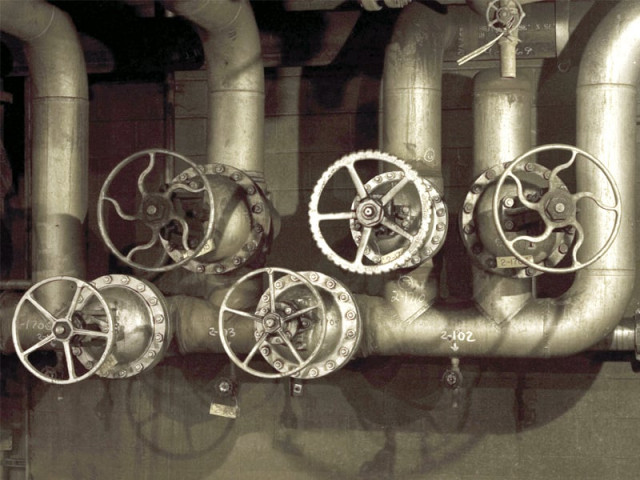Gas wars: Govt to press ahead with energy-efficiency audit
Gas supply will be diverted from Fauji Fertilizer to KESC.

Setting aside concerns of fertiliser companies, the government has decided to press ahead with plans to conduct an energy-efficiency audit in order to provide gas to efficient units on a priority basis.
The decision came in a high-level meeting, held here on Wednesday and chaired by Petroleum Secretary Ijaz Chaudhry, which discussed modalities for energy-efficiency audit of fertiliser plants. The meeting was attended by representatives of fertiliser manufacturers and gas companies.
Earlier in a meeting on December 15, 2011, the Economic Coordination Committee (ECC) had approved a summary relating to energy-efficiency audit of fertiliser plants.
In Wednesday’s meeting, the petroleum secretary announced that 70 million cubic feet of gas per day (mmcfd), which was allocated to Fauji Fertilizer Bin Qasim, was being diverted to the Karachi Electric Supply Company (KESC).
This step would help the KESC increase power production by 350 megawatts, he said, adding Pakistan Electric Power Company (Pepco) had been prevented from exporting 350 megawatts to the KESC, which would be given to Punjab to overcome power crisis.
The meeting was told that the National Productivity Organisation (NPO) had been appointed auditor for the programme, but it was pointed out that the NPO lacked audit expertise, therefore, it hired a consultant.
Some questions remained unanswered including who would bear expenses of the auditor and how fertiliser firms having efficient and inefficient units would be treated.
The Ministry of Petroleum wants fertiliser companies to bear the cost of energy audit, but they refuse to pay.
A participant of the meeting told The Express Tribune that some major players opposed the energy-efficiency audit plan. Disconnection of gas supply to inefficient plants also came up for discussion, but it would be difficult to cut off gas supply to fertiliser firms, which have gas supply agreements with state-owned companies.
Fertiliser companies also opposed the audit programme, arguing that there was no such provision in the gas sale agreements inked with gas suppliers.
“If the government wants to conduct energy-efficiency audit of fertiliser companies, it should also undertake audit of other sectors, like the textile industry,” a source said quoting representatives of fertiliser companies.
Substantiating their arguments, the fertiliser companies pointed out that the government had allowed import of old plants in the past and that made it illogical to conduct the audit. “It is unfair to compare energy efficiency of old and new fertiliser plants,” they stressed.
The petroleum ministry has also given guidelines to Sui Northern Gas Pipelines Limited (SNGPL) and Sui Southern Gas Company (SSGC) to conduct an audit of captive power plants (CPPs) and independent power plants (IPPs).
The efficiency benchmark has been set at 50% to 60% for the plants operating on gas. But no benchmark had been set for the fertiliser plants so far, a government official said, adding terms of reference for the audit were yet to be finalised.
The energy audit of those fertiliser plants, which had not been operated at 100% capacity for the last two years, could not give accurate results.
Under the audit programme, the fertiliser plants operating at low capacity will be penalised and their share of gas will be reduced and diverted to the most efficient plants. An efficient fertiliser plant produces 42 tons of urea by utilising one million cubic feet of gas per day. However, some plants are producing less than 38 tons with the same gas supply.
Published In The Express Tribune, June 21st, 2012.



















COMMENTS
Comments are moderated and generally will be posted if they are on-topic and not abusive.
For more information, please see our Comments FAQ